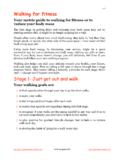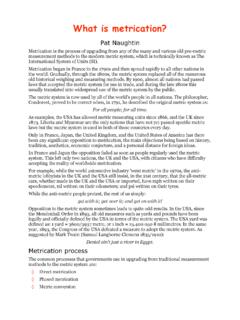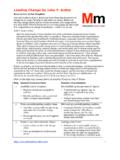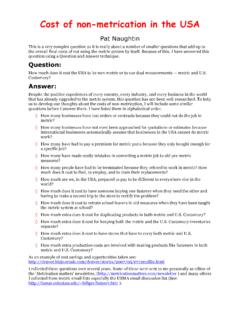Transcription of Spelling metre or meter - Metrication matters and metric ...
1 1 of 15 Pat Naughtin 2008 Spelling metre or meter By Pat Naughtin Some time ago, a journalist in the USA gently chided me for the way I spell meter and metre in the Metrication matters newsletter. In reply I wrote: I use both meter and metre . I use meter when I refer to any device that measures something (such as gas meter , parking meter , speedometer, and voltmeter) or to a particular measurement (such as diameter and perimeter). I use metre when I refer to a unit of distance (such as in micrometre, millimetre, metre , and kilometre). That is, as a general rule of thumb, I use meter if referring to a device that does the actual measuring or to the name of a particular measurement, and I use metre if the unit and the subject is related in any way to the metric system more formally known as the International System of Units (SI).
2 For example, I might use an odometer to measure a perimeter, but I would choose to do so in millimetres, metres, or kilometres. But the reporter's question enthused me to explore this question further. First, a little history: In the 1600s and early 1700s, there was no standard for English Spelling anywhere in the world. The first English dictionary, Table Alphabeticall by Robert Cawdrey (1604), is recognised as an attempt to try to support the use of English words at a time when there was a strong inward flow of foreign words into the English language. However, this dictionary did not attempt to provide advice on Spelling . An Englishman, John Wilkins, in An Essay Towards a Real Character and a Philosophical Language (1668) first described the idea for a universal measure of length to be used by all people in all nations.
3 This was the first major proposal towards what eventually became the metric system and later the International System of Units (SI) (See: ) To quote from John Wilkins' essay: To which purpose, it were most desirable to find out some natural Standard, or universal Measure, which hath been esteemed by Learned men as one of the desiderata in Philosophy. Tito Livio Burattini was the first to use the word metro to mean an actual physical measure of length. He initially used the words metro cattolico (to mean universal measure) in 1675, but this was subsequently shortened to metro. It seems likely that Burattini translated John Wilkins universal measure into metro cattolico after reading John Wilkins, An Essay Towards a Real Character and a Philosophical Language (1668), as there are many parallels between the Wilkins and the Burattini proposals.
4 Apart from the idea of a universal measure, these parallels included the concept that a universal measure could be realised with the length of a pendulum that beats with a regular period of one second. The idea of definite advice on English Spelling arose following the publication of the Dictionary of the English Language by Samuel Johnson (1755). Unlike modern dictionary writers, Samuel Johnson wrote prescriptively. He intended to set standard spellings (and definitions) that others would follow. Noah Webster (1758/1843) held a similar view but modern (20th century) dictionary writers moved away from this idea, following the lead of James Murray at the Oxford English Dictionary, and instead described the ways that a word has been used in the past as a guide to how readers might choose words in future.
5 This idea is encapsulated in the sub-title to the Oxford English Dictionary On Historical Principles. Spelling metre or meter 2 of 15 Pat Naughtin 2008 Modern dictionaries are now descriptive rather than prescriptive. The Merriam-Webster Company now holds this view; on their web site they write about criticism of their 1961 edition, Most of the criticism was aroused by Merriam's editorial philosophy, which holds that dictionaries shouldn't try to dictate or influence the development of language, but should only record its actual use. You can find this reference at: In France the word m tre was first used as a measuring unit in 1791 after it was actively promoted by Jean-Charles De Borda (1733/1799). The French word, m tre, had come from the Italian word metro (which was derived from the Greek word , a measure).
6 When the word metre was first used in English in 1797 to mean a measure of length, it simply took the original Spelling of m tre directly from French, but changed the accented to an unaccented e. From 1797, the metre Spelling became common in all English speaking countries, including the USA. For example, Benjamin Franklin, Thomas Jefferson, and John Quincy Adams all used the Spelling metre . Later, the metre Spelling was recognised by the Conference G n rale de Poids et Mesures (CGPM) and the Bureau International de Poids et Mesures (BIPM), who maintain the International System of Units (SI). In the official BIPM translation of The International System of Units (SI) brochure into English they use the Spelling metre throughout. In 1828, the publication of An American Dictionary of the English Language by Noah Webster introduced many different ways of Spelling words that are now characteristic of Spelling in the USA.
7 This was the first dictionary publication where the Spelling , meter , was favored over the Spelling , metre , for the international unit of length measurement (Webster retained the Spelling of metre for feet in poetry). In 1866, The metric Act was introduced (as 596) in the 39th Congress of the USA. The House passed it on 1866 May 17; the Senate passed it on 1866 July 27; and it was presented to the President and signed the next day. In part, it read: It shall be lawful throughout the United States of America to employ the weights and measures of the metric system; and no contract or dealing, or pleading in any court, shall be deemed invalid or liable to objection because the weights or measures expressed or referred to therein are weights or measures of the metric system.
8 See: ~hillger/ where you will notice that the spellings, liter and meter , were used throughout the document. In 1877, the New York Times published a pro- metric article in which it consistently spelled metre as metre . (See metric Today 2008 October) In 1893, the Mendenhall Order of 1893 used metre , litre, and gramme for metric units in the USA (See ~hillger/ ). In 1906, the President of the USA, Teddy Roosevelt, proclaimed the use of 300 simple spellings based on the recommendations of an organisation called the Simplified Spelling Board. This list of words can be found at and they include words such as: color, center, check meaning a bank draft, defense, judgment, and traveled. These words were to be implemented in government departments as standard spellings for the USA.
9 In this list the Spelling , meter , is shown as being preferred to the Spelling , metre . A few weeks later, the Congress of the USA overruled President Roosevelt's proclamation on Spelling , so that it never had legal effect. It is currently legal in the USA to use either Spelling of metre or meter . In 1926, although Webster's New International Dictionary gave the alternative spellings meter and metre for music and poetry, this edition still gave the word for a length-measuring unit as meter without the alternative of metre . The expressions meter -stick and meter -wheel were similarly treated without the options of metre -stick and metre -wheel. It seems that the Spelling metre or meter 3 of 15 Pat Naughtin 2008 editors of Webster's dictionary had a policy preference for the Spelling , meter , only when it is applied to a unit of length but not when it is applied to a foot of poetry!
10 Webster's dictionaries have not consistently applied their prejudice against the Spelling of metre for a unit of length over the years. For example, Webster's New School and Office Dictionary (15 reprints from1943 to 1960) distinguishes between a meter as an instrument and a meter , metre as a unit of length with these entries: meter (me'ter). n. an instrument for registering automatically; the amount measured by it. meter , metre (me'ter), n. a rhythmic arrangement of syllables in verse; unit of length in decimal system = inches. In 1971 the National Bureau of Standards in Washington issued an official translation of a French document on the International System of Units (NBS Special Publication 330). This document presented the units adopted at a meeting of the Conf rence G n rale de Poids et Mesures (CGPM) held in S vres near Paris in 1960.






